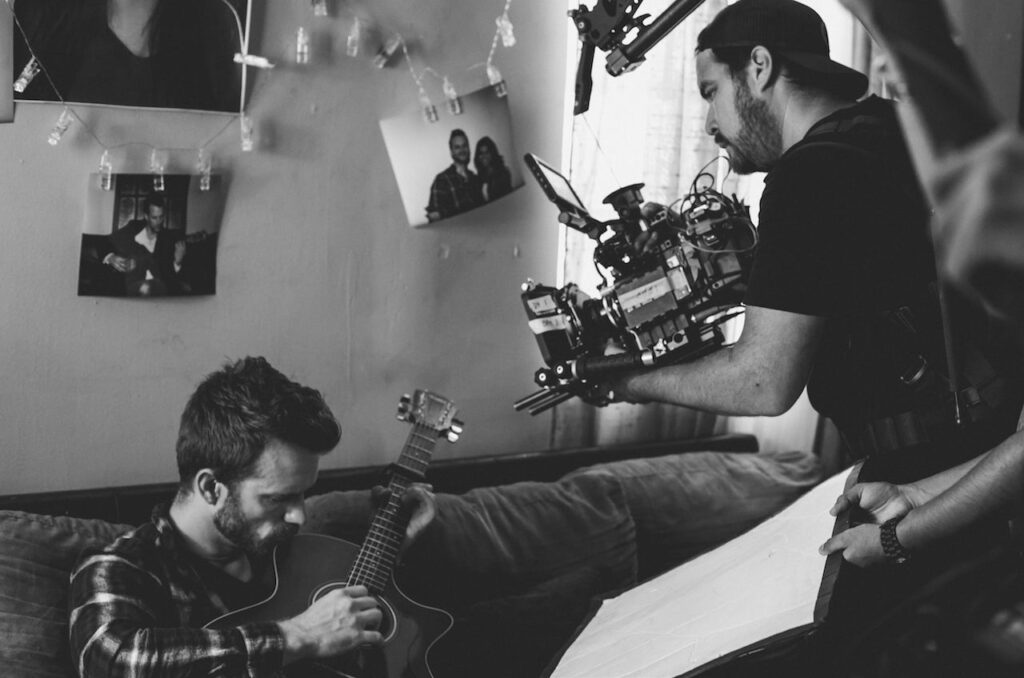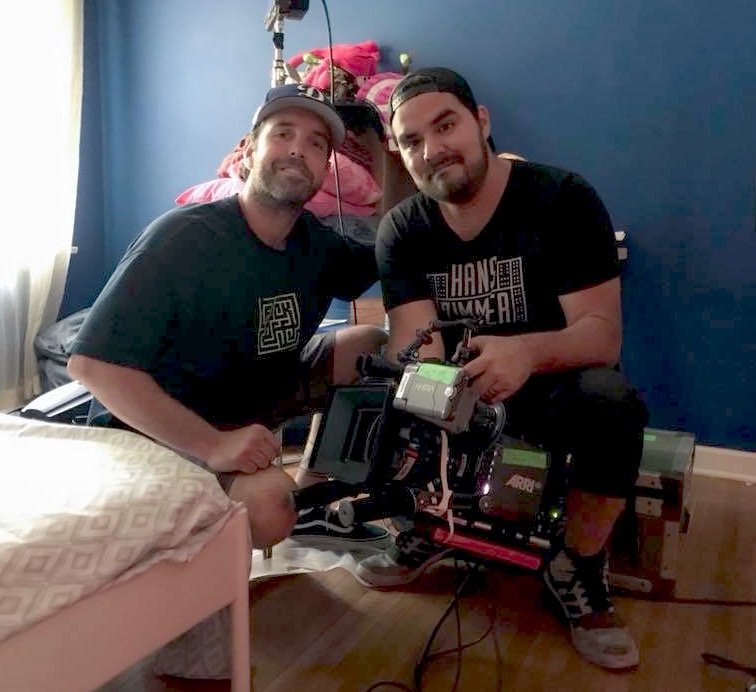Horacio Martinez graduated from New York Film Academy’s 1-Year Cinematography program last year, but the hard-working lover of film finds education everywhere he goes. That includes everything he learns whole on set, where his work ethic and passion for cinema has made him a valuable asset to any film crew.
Martinez really spoke with NYFA about his time at the Academy’s Los Angeles campus and his work on a feature film starring Ed Asner as 2nd AC. In addition to all the technical skills he’s picked up along the way, Martinez stresses that human relationships between the crew and between fellow students and instructors are just as important when forging your career in film.
New York Film Academy (NYFA): What was the journey that lead you to the New York Film Academy?
Horacio Martinez (HM): Movies have been a part of my life ever since I was kid. I’ve always related episodes or experiences in my life with films. In my teenage years, I developed a curiosity about photography. At the same time, I worked as a composer for short films and various behind-the-scenes for photographers and videographers. After I moved to the USA from Venezuela, I explored my passion for photography, doing a lot of Urbex (Urban Exploration). It was a wonderful experience and I got to know every corner of the city.
I felt I needed something beyond urban and landscape photography. After doing some research, I decided to pursue my original dream of trying to find a place in the industry of visual storytelling. I found NYFA as my home as a professional, and also as a human being. Cinematography really changed my perception of life, my surroundings, the way I see and analyze problems to opportunities, and everyday life.
NYFA: Why did you choose NYFA’s 1-Year Cinematography program?
HM: Cinematography, in my opinion, is the perfect marriage between technology and art. It is a very passionate career. We have to be chameleons and adaptable. We have to get into people’s minds (in most cases, the director’s) and meticulously dissect their thoughts and ideas, and then translate them into reality with the use of wonderful, amazing tools. Technology can help us in solving problems and achieving a unique look for each film.
I looked at the instructors, all the subjects and the approaches to cinematography, and found that the 1-Year Cinematography program was a great match. I needed to formalize my education, and open my eyes professionally about the craft itself. Since I’m in my 30s, I am hungry to go out and explore the world of filmmaking and find the right path to success.
NYFA: What were your favorite moments at NYFA?
HM: Getting to know all of my classmates and people from other departments that share the same passion as me about storytelling. Forging relationships and earning people’s respect one day at a time.
I loved all of my classes, so it is very hard for me to choose one specific favorite instructor or class. They were all shaping my life as a cinematographer and making me a different person since the day I started. All the classes are of equal importance. All the instructors are very passionate professionals that really care about teaching not only their knowledge, but also personal experiences that really helped me to have a better understanding about the craft of cinematography, and the protocol and relationships in the industry.
NYFA: Shortly after graduating, you had the opportunity to work on an independent feature film as the 2nd Assistant Camera (2nd AC). Can you tell us about that?
HM: That was an amazing opportunity and I am really thankful for it. When I was at NYFA, one of my main priorities was to create strong relationships not only between my classmates and fellow students, but also between me and the instructors. In this case, Anthony B. Richmond ASC, BSC called me on a Saturday afternoon, asking me if I could join his son Gaston on a low budget feature film starring Ed Asner. I immediately said yes. At first, I couldn’t believe that I got a personal phone call from Tony himself asking me if I could work with his son.
Everything turned out amazing, and I really learned a lot about all the duties of a 2nd AC in the real world. Of course, what I learned at NYFA was a huge influence on my workflow.
NYFA: As the 2nd AC and media manager, what were your responsibilities on the film?
HM: My first priority was to be invisible. That’s a thought that I always had with me while working on set. Invisible to the point that I had to make the 1st AC’s — Gaston Richmond’s — job easy. I had to keep the department afloat. Everything has a domino effect. If one tiny little thing breaks, falls, or is not charged, then the department could be delayed big time, so anticipation was key.
I also needed to keep the camera in order, keep all the batteries charged, keep track of all the rolls that we shot and what day they were shot. When things flow smoothly, it’s thanks to order, organization, and protocol.
I also had to change lenses in extreme situations, and change camera magazines. I had to run blocks and blocks down the street during a massive heatwave in order to back up the files to three hard drives at the same time, while keeping in constant communication with the Sound Mixer to also get the sound files and back them up in the proper way.
Gaston was a great mentor, and I really learned a lot from him. He gave me great support, and helped me keep things in balance with the thousands of details that people assume are going to be taken care of. It is true that no one is going to tell you how to do your job at first, but I saw that as an opportunity to show them who I really was and all that I knew.
NYFA: Were there any specific challenges for the camera department on this film? How did you handle those issues?
HM: There were a lot of challenges like I mentioned before, but being a 2nd AC is a challenge itself. You are the base of the camera department, the one that keeps everything running smoothly. If you take care of the details, people will trust that you will do your job.
My first focus was to have a great relationship with my department. We are a team, and we all wanted to have things moving forward smoothly. My relationship on set with Gaston (1st AC), was really important since he and I were working so closely. As I said, he was very reliable, incredibly supportive on set, and a great guy with a great personality. With a good attitude and always keeping our cool, we solved any challenges that we had to overcome.
It is also extremely important to have a good relationship with every single department on the project. You never know when someone will have to help you, and basically save your life. I also offered myself as help to other departments when needed.
Life on set is not easy, it is basically creating art out of chaos. That’s why it is extremely important to have good relationships with everyone, have a great attitude, a good sense of humor. Be humble at all times, and ask for help when you need it. These factors will help you overcome all the challenges on set.
 NYFA: Did your classes at NYFA prepare you for working on a professional set?
NYFA: Did your classes at NYFA prepare you for working on a professional set?
HM: Definitely. 100% of the material, cinematography practicums, and classes that I had at NYFA were of huge help, especially when it came to actually knowing my role. You have to respect the protocol of communication between members of your department, and with other departments as well.
I never felt out of place, and I spoke the same language as the DP. This was especially helpful when we had to be very technical, with camera resolution, lenses, filters, white balance, etc.
NYFA: What advice would you give to current students about starting their careers?
HM: Never doubt yourself. Always be yourself. Be willing to learn, because one of the most exciting things about this career is learning about new technologies, developing skills to solve problems, and experimenting with different looks. This is not a 9-to-5 career, and every day is not the same. The challenge is how to adapt ourselves, and use our personality and creativity to leave our mark and identity in the visual story we are telling.
NYFA: What projects do you have coming up next?
HM: Right now, my mission is to join projects that will help me develop my skills and become a better professional. I hope to join the camera union (Local 600) in the near future. I want to learn, I want to meet people, and create bridges and relationships.
In the meantime, I am prepping a music video and a couple of short films with great directors, all of them out of NYFA.
The New York Film Academy thanks Horacio Martinez for speaking about his experiences and looks forward to the future successes his drive, passion, and hard work will undoubtedly bring him!